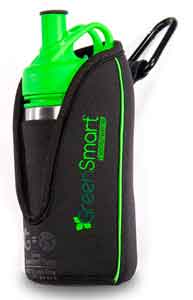Here are some actions you can take to reduce the environmental impact of bottled water.
 |
This eco-friendly NeoGreene bottle carrier can be used to protect and chill reusable water bottles. |
Drink Tap Water Instead. As noted in last week’s article, 25-40% of bottled water is just filtered tap water in disguise. Why not use your own? It often tastes just as good, if not better and unlike bottled water, public water supplies are tested regularly. (If you have questions about the quality of water from your public drinking water system, check out Consumer Confidence Reports at www.epa.gov/safewater/dwinfo/index.html.) Hold a tap vs. bottled water taste test with friends to see if anyone can really tell the difference. If you do not like the taste of chlorine, store an uncovered pitcher of water overnight in the refrigerator to let the chlorine dissipate.
Filter Your Own Water. If you want, filter tap water to ensure purity. Carafe filters like Pur Advantage or Brita Classic are inexpensive and work well, according to Consumer Reports. Faucet-mounted or under-sink filters or whole house filters are a more expensive option, as is buying a jug water bottle dispenser. Some refrigerators have built-in dispensers that filter and chill water.
Demand that government agencies use tap water where feasible. In New England, state agencies spend one-quarter to one-half a million dollars each year on bottled water for employees (source: CAI, 2009). The City of San Francisco banned state agencies from buying single-use bottled water, instead installing filters and using bottle-less point-of-use dispensers in offices. Point-of-use water coolers are connected directly to a tap, and fitted with filters to remove chlorine, other chemicals and minerals. Of course filtration systems must be maintained, and correct filters used and periodically replaced. Pitchers of water can be used at community events.
Safely Reuse Bottles. If everybody in the U.S. used each water bottle twice, it would reduce waste generation by 1.25 million plastic bottles per HOUR (source: Clean Air Council) When you’re on the go, bring along a refillable, washable bottle. Do not re-use disposable plastic water bottles repeatedly. A University of Calgary study found that 64% of reused disposable bottles were contaminated with bacteria like E. Coli. The worst type is a sports bottle closed by pressing down with a finger. Do not reuse bottles that have the number 3, 6 or 7 on the bottom, as those numbers indicate the presence of chemicals like BPA that some scientists and environmentalists believe are cause for health concerns. Disposable plastic bottles should not be put in the dishwasher, as high temperatures will cause the plastic to crack, offering bacteria hiding spots and releasing more BPA.
Instead, use stainless steel or aluminum reusable bottles like those made by Bilt or Thermos (which keep liquids cool and last 15-20 years), or BPA-free polyethylene bottles, such as Sigg (available in a variety of sizes, colors and designs), Born Free (for babies and toddlers), Eastman Tritan, Klean Kanteen, CamelBak, or Nalgene. You can find them at major department or sporting good stores or online, starting at $10. Organizations can make up bottles imprinted with their logo for workers or as a give-away to customers.
Recycle. Recycling of plastic is required by law in CT. CT's bottle bill was expanded on 10/01/2009 to include water and other non-carbonated beverage bottles, so now you can redeem them just like soda bottles for 5 cents each. A number of towns have implemented single-stream recycling, so you can combine various types of recyclables in one container, making it even easier.
Buy bottled water in glass containers if you can find it. However, most companies have switched to plastic due to production costs and shipping weight. You can reuse other glass bottles with a cap (like Snapple) and carry them in soft carrier like a Neogreene insulated tote.
Buy bottled water made in compostable containers. BIOTA bottles are made from corn, and can be composted in commercial operations. Doug thought he might try to make one out of a hollowed tree limb.
Buy from suppliers who reduce the amount of plastic used. In an attempt to appear more environmentally conscious, some manufacturers have redesigned bottles and reduced the weight by 20-30%, which also saves energy for transportation from portal to portal (source: Wall Street Journal).
Support changes in legislation. States with deposit laws on beverage containers recycle up to 80-95% of containers (source: MSNBC.com, 2005). Note that this approach has been vehemently opposed by the beverage industry.
Support public funding for maintaining and upgrading aging public water supply systems to deal with wasteful leaking pipes, and ensure that the best technology is used to provide the public with the quality and quantity of water we all desire and deserve.
|

